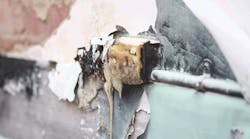While electricity plays a major role in all our daily lives, we often take its power and the conveniences it provides – along with its potential for fire-related hazards – for granted.
That’s why the National Fire Protection Association (NFPA) actively is supporting National Electrical Safety Month, an annual campaign officially sponsored by the Electrical Safety Foundation International (ESFI), which works to raise awareness of potential home electrical hazards and the importance of electrical safety.
According to NFPA statistics, an annual average of nearly 48,000 electrical fires occurred in U.S. homes between 2007 and 2011, resulting in 455 deaths, more than 1,500 injuries and $1.48 billion in direct property damage. Roughly half of those fires involved electrical distribution or lighting equipment.
“Electrical equipment and appliances in the home carry potential fire risks that can cause significant damage to people and property,” said Lorraine Carli, NFPA’s vice president of Outreach and Advocacy. “Fortunately, there are many simple steps people can take to greatly reduce those risks, such as using the designated lightbulb wattage for lamps and not overloading outlets.”
Many of National Electrical Safety Month’s electrical safety messages are derived from NFPA 70, National Electrical Code (NEC), the benchmark for safe electrical design, installation and inspection, and from the National Electrical Safety Month 2015 Electrical Safety Advocate Guide. Here are some electrical safety tips:
- Have all electrical work done by a qualified electrician.
- Only plug one heat-producing appliance (such as a coffee maker, toaster, space heater, etc.) into a receptacle outlet at a time.
- Arc fault circuit interrupters (AFCIs) are a kind of circuit breaker that shuts off electricity when a dangerous condition occurs. Consider having them installed in your home. Use a qualified electrician.
- Use ground fault circuit interrupters (GFCIs) to reduce the risk of shock. GFCIs shut off an electrical circuit when it becomes a shock hazard. They should be installed inside the home in bathrooms, kitchens, garages and basements. All outdoor receptacles should be GFCI-protected.
- Test AFCIs and GFCIs once a month to make sure they’re working properly.
- Check electrical cords to make sure they’re not running across doorways or under carpets.
- Extension cords are intended for temporary use; have a qualified electrician add more receptacle outlets so you don’t have to use extension cords.
- Use light bulbs that match the recommended wattage on the lamp or fixture. There should be a sticker that indicates the maximum wattage light bulb to use.
